By Bethie Timmons
The Latino Mental Health Coalition is a group of individuals who identified a need within the Latino faith community to address mental health issues occurring in the context of the church. Many individuals go to their church leaders first when they are experiencing mental health concerns or family struggles and knowing how to serve people well in these difficult situations, beyond offering spiritual support, can be life-saving and life-changing. Many individuals and families in the Latino culture do not talk about mental health due to fear of the stigma of being called “locos.” There might be a lack of understanding of the signs or symptoms so feelings are dismissed. Many in the Latino community have been taught that private “home” matters should not be taken outside the home. Strong cultural traditions exist and it may be that someone in the family has sworn by the “jarabe the tia lupe” or VapoRub. And although these might work for many illnesses, individuals need to be aware of the limitations. Drinking tea for nerves to soothe oneself is good, but those nerves could be a sign of something more troubling. In light of the current immigration focus of our nation many immigrants who might be here illegally and fear deportation may be hindered from being open about their health. Also, many immigrants, whether legal or illegal, work independently or have low-wage jobs which affect their ability to get medical insurance.
Pastors are doing a great job in addressing spiritual concerns of their congregations but felt inadequately trained to handle mental health needs. Their commitment to becoming informed about mental health issues including anxiety, depression, suicide prevention and substance abuse led them to reach out to Baylor University’s Diana R. Garland School of Social Work and Dr. Dennis Myers to gather pastors and mental health professionals in the community to assist in addressing this very important issue in their churches.
Pastor Ruben Andrade of Family of Faith Worship Center has led the charge and has been instrumental in engaging pastors and their congregations. Last year the coalition hosted a conference at the Garland School of Social Work titled “Mental Health: Tools for the Church.” We hosted approximately 75 people and included breakout sessions, information tables identifying community mental health agencies and a panel made up of local pastors who spoke about the need for mental health awareness in their congregations. Our keynote speaker talked to the attendees about being a survivor of a family member who completed suicide. Her presentation was powerful. Attendees agreed that the conference was a big success and decided that an annual offering would benefit the community. One attendee who was very inspired by the information shared at the conference went on to become a Mental Health First Aid Certified Trainer and is now working with Latino churches in South Texas.
The conference opened up conversation about mental health issues and provided pastors and other church leaders the opportunity to speak openly about mental health and the challenges of addressing this issue in their churches. It was agreed that there is a stigma associated with mental health and while pastors are very aware of the challenges persons with mental health issues encounter, they were not sure about how to best address concerns in the context of the church. The conference also provided pastors and church leaders the opportunity to connect with local community mental health providers and their referral process for connecting one of their parishioners.
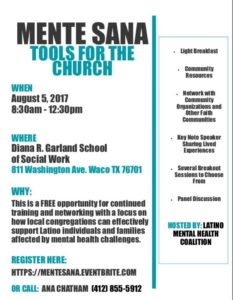 The success of the conference provided an impetus to continue this important work among the Latino community through the coalition. We have provided additional training in the churches around mental health first aid, suicide awareness and prevention and our local chapter of NAMI has presented support information for families who care for individuals with mental health issues. We also identified the need for Spanish speaking counselors and have developed a presentation to recruit Latino college students into the counseling profession. AND on August 5, 2017 at Baylor University’s Diana R. Garland School of Social Work the coalition will host the 2nd annual “Mente Sana: Tools for the Church.” We are excited to continue this important conversation with a panel, workshops and a keynote speaker. To register for the conference which is free of charge go to https://mentesana.eventbrite.com.
The success of the conference provided an impetus to continue this important work among the Latino community through the coalition. We have provided additional training in the churches around mental health first aid, suicide awareness and prevention and our local chapter of NAMI has presented support information for families who care for individuals with mental health issues. We also identified the need for Spanish speaking counselors and have developed a presentation to recruit Latino college students into the counseling profession. AND on August 5, 2017 at Baylor University’s Diana R. Garland School of Social Work the coalition will host the 2nd annual “Mente Sana: Tools for the Church.” We are excited to continue this important conversation with a panel, workshops and a keynote speaker. To register for the conference which is free of charge go to https://mentesana.eventbrite.com.
Growing up in El Paso, TX, my family and I had the distinct pleasure of living on the border and within sight of Juarez, Mexico. We took many trips to Juarez especially when family from other parts of the country visited to experience the culture and traditions of our sister city. The marketplace and the grocery store where you could buy the best hard rolls was always a hit. The other opportunity for me to experience the rich Latino culture was spending time with my best friend and her family. I made it a point to show up at her house at dinner time so that I could partake in a regular staple of their family meals, homemade tortillas! There is nothing like a homemade tortilla and if you have never experienced one you are truly missing out. What was unique about her family was their strong cultural identification that included numerous family celebrations and their honor to the matriarch in the family, her grandmother. I remember the grandmother as being a tiny woman with a soft voice who could silence a room with her words. She only spoke Spanish so I did not know exactly what she was saying but understood that it was important and that you had to listen. The love and support that existed within this large extended family was something to envy. This family stood by one another no matter what. Their faith community was also an integral part of their living and Sundays in this family was an all-day affair. When a family member experienced a problem the rest of the family gathered and provided assistance or called in the priest to provide direction. However, in looking back I can see how major difficulties were handled in isolation because one simply did not take problems outside of the family. It is through the coalition that we hope equip pastors and church leaders to encourage families to reach outside for help when needed.
 Elizabeth (Bethie) Timmons is a Licensed Clinical Social Worker and the Director of Clinical Services at HOTRMHMR. She has lived in Waco for 32 years and has been involved in a variety of capacities with the children and families of McLennan County, providing therapy and support. Her specialty includes trauma and mental health issues.
Elizabeth (Bethie) Timmons is a Licensed Clinical Social Worker and the Director of Clinical Services at HOTRMHMR. She has lived in Waco for 32 years and has been involved in a variety of capacities with the children and families of McLennan County, providing therapy and support. Her specialty includes trauma and mental health issues.
The Act Locally Waco blog publishes posts with a connection to these aspirations for Waco. If you are interested in writing for the Act Locally Waco Blog, please email [email protected] for more information.
By Maggie McCarthy
Texans are a fierce bunch. I witnessed this first-hand when the local Veterans hospital was under threat of closure in 2003. The Central Texas community mobilized, a blue-ribbon group was formed, Veterans organized and the citizenry signed up to write letters and plead with Congressmen.
Their red-blooded pride was understandable as the hospital had served Waco and throngs of returning military members since 1932. The campus, with its sturdy brick buildings and handsome terracotta tile roofs, were placed at a bucolic green landscape to allow those suffering the wounds of war to receive health care and comfort as they grappled with their war-weary experiences. It was thought that simply strolling around the grassy loop of buildings could have a therapeutic benefit.
This quest to provide relief to those who bore the brunt of battle, including the psychological impact, is part of the mission that continues today. But back in 2003, it was touch and go.
Luckily, pride, planning, and persistence prevailed. Not only was the hospital spared from the wrecking ball, some parts emerged in a new and improved rendition. The mission was galvanized by a bi-partisan effort to not only keep the campus intact, but to provide specialized services for new and emerging problems.
The Iraq war was less than two years old, but those in active combat were already dealing with the devastation of improvised explosive devices (IED). Unlike their forefathers, who knew the deadly force of bomb blasts, modern military were equipped with protective armor that kept them alive, but with brain damage that might not show up until much later, a condition now known as Traumatic Brain Injury (TBI).
In addition to the physical ills, Veterans carried home the psychological scars of war that were heavier than any of the armor and ammo they could lug. Post-traumatic stress disorder (PTSD), depression, alcohol and drug abuse, and even thoughts of suicide would need special treatment and approaches.
For these men and women, there was a destination that could help probe solutions to these vexing problems that surfaced. But it required highly trained researchers who sought out the best approaches, gathered the data, field tested the theories and shared results in ways that advanced mental health care.
Waco should be proud to have such a place that is a hub of mental health researchers and practitioners. It is called the Center of Excellence for Returning War Veterans and it is part of the VA healthcare system (regionally called VISN 17).
Today, Building 93 on the historic campus maintains it tranquil and traditional exterior, but inside there is a buzz of activity from some 45 individuals who specialize in veteran mental health. One of only three Centers of Excellence in the country, the Waco VA campus was chosen by Congress in 2006 to conduct specialty research on our country’s returning Post-9/11 veteran population, which include Veterans enlisted in any of the military branches during the Operation Enduring Freedom (OEF), Operation Iraqi Freedom (OIF), and Operation New Dawn (OND) campaigns. The signature research focus is PTSD.
There are more than 35,000 unique OEF/OIF/OND Veterans registered in the Central Texas Veterans Health Care System (CTVHCS) and more than 40,000 active duty military service members in the area. An additional 300,000-plus family members (including spouses and children, retirees, and survivors of deceased Veterans) are touched by military matters, according to a recent Fort Hood census.
In addition to grant support from the Department of Defense (DoD) and the National Institutes of Health (NIH), the Center collaborates with Texas A&M and Baylor University, and the Central Texas Veterans Research Foundation, a nonprofit organization that helps facilitate a broad spectrum of Veterans research.
Few people may know the quiet work that is done to understand, and help, those who served. But I, for one, am glad that Waco persevered in saving the hospital. The researchers who daily strive to probe, problem solve and publish their findings may help future generations of Veterans. Then, they too can become the fierce defenders of the people and places that heal.
 Maggie McCarthy is the Executive Director of the Central Texas Veterans Research Center and has spent more than 25 years managing and consulting with nonprofit organizations, with an emphasis on philanthropic and grant management foundations. As a volunteer, she has helped to support Veterans organizations and the formation of the Veterans One Stop in Waco, Texas. To learn more about CTVRC please visit, www.ctvrf.org.
Maggie McCarthy is the Executive Director of the Central Texas Veterans Research Center and has spent more than 25 years managing and consulting with nonprofit organizations, with an emphasis on philanthropic and grant management foundations. As a volunteer, she has helped to support Veterans organizations and the formation of the Veterans One Stop in Waco, Texas. To learn more about CTVRC please visit, www.ctvrf.org.
The Act Locally Waco blog publishes posts with a connection to these aspirations for Waco. If you are interested in writing for the Act Locally Waco Blog, please email [email protected] for more information.
By Jennifer Alumbaugh
The integration of creative process with therapy has been a long tradition in the mental health field. It is used to “explore feelings, reconcile emotional conflicts, foster self-awareness, manage behaviors, addictions, and coping, develop social skills, improve reality orientation, reduce anxiety, and increase self esteem,” according to the American Art Therapy Association, “the goal in art therapy is to improve or restore a client’s functioning and their sense of personal well-being.” The creative process using visual arts of writing, painting, drawing, sculpture, mixed media, music, and other expressions, allow people to connect with their subconscious and to other parts of themselves beyond where language can take us. For some people who experienced trauma at pre-verbal stages of development, or during a time when they were learning their first language, but now only speak a second language, engaging in a visual process facilitates that connection to feelings and experiences for which a person may not have language.
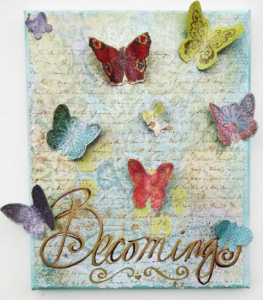
(Original mixed media canvas by Jennifer Alumbaugh, LMFT)
The physical act of creating, using our hands to make, to shape, to move a medium around a page or a canvas or a block of clay, also connects us to different levels of our selves which allows for insights, awareness, and coping that is accessible beyond traditional “talk therapy.” In working with couples and families, creative process engages people to complete tasks, to work cooperatively, to see glimpses of the other’s thoughts and experience in fresh ways that can move a couple or family through conflict, through grief, through challenges, through communication toward a place of healing and wholeness.
When I consider the realm of mental health, I gather into that the following experiences: mental illness, grief and loss, and trauma recovery. Because while grief is not a mental illness, the experience of loss can result in mental health concerns. And while having survived a trauma incident or complex trauma is not a mental illness, the resulting PTSD, cPTSD, and other diagnoses are mental health issues. One of the things I love about using creative process in session with clients, is how art can help disrupt patterns of automatic thinking and can boost a client up out of a rut. Sometimes we create a visual representation of the emotion they are most struggling with: fear, sadness, anxiety, grief, anger. Sometimes it looks like a monster; sometimes it is a looming shadow; sometimes it is a silly creature that makes a client laugh instead of being afraid; sometimes they are small, pocket-sized beasts; sometimes they are great larger-than-life manifestations.
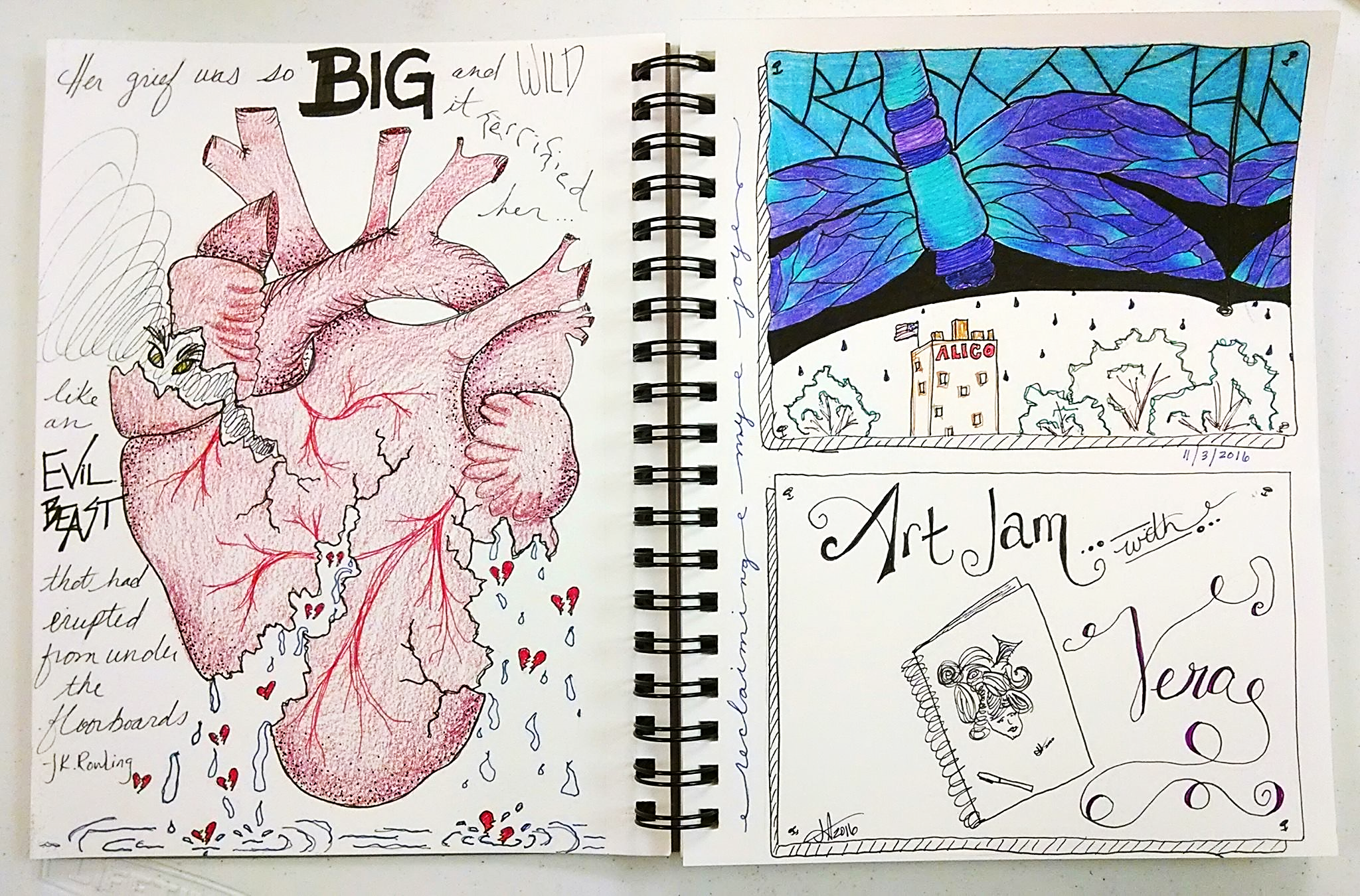
(Original mixed media drawing by Jennifer Alumbaugh, LMFT; quote by J.K. Rowling)
Naming those feelings—actual people names—and creating a visual image of them, helps to externalize the process. For me, grief is Harold and depression is Gertrude. They show up often, like uninvited guests, and over stay their welcome! But when I create caricatures out of these feelings, and create goofy personas to go with them, it shifts the power balance and gives me the chance to call the shots—to decide whether or not I let them in, or how long they get to stay. It is the same for clients. When we name and externalize our struggles, it separates them from us—so we are not afraid, fear is visiting us. We are not depressed; depression crashed our party. We are not anxiety; anxiety interrupted our meeting. Art gives us the tools to create a tangible, concrete representation of that with which we are coping bringing it out of the abstract and into the finite. Once we accomplish that, then we can feel more empowered to cope, manage, and control our feelings and experiences.
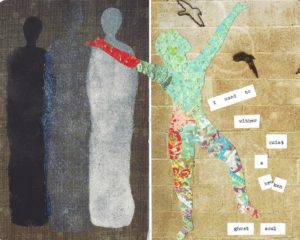
Original mixed media artwork and poem by Jennifer Alumbaugh, LMFT, 2016
There are many people who engage in creative expression outside of the context of a therapy session and who find that process to be therapeutic. There is something deeply satisfying about creating with our own two hands. For many, the act of creating is a soothing, meditative, practice. For me, I call it a “mind vacation,” because when I am making art, that is the only thing my mind is thinking about. I feel joy. I feel peace. I feel delight. Even when I mess up—which is often, I appreciate my process and everything I learn along the way.
I’ve been a poet and spoken-word artist for a long time and I found incredible release in exploring my grief, depression, and trauma recovery, through the medium of poetry. But I have found that the process is twofold—there is the creating, and then there is the sharing. I found that it wasn’t enough to create for myself and by myself and that as I began to share my work with others, I found this extraordinary, medicinal “me too.” Sharing my creative expression, my interpretation, my attempts to make meaning out of my experiences, it connected me with others who had also survived, struggled, and coped with similar things. I learned that I am not alone. And I learned that my creative expressions give others permission to feel and to question and to work through their own experiences. I realized that when we share our process of healing, coping, recovering, with others, there is no place for shame to grow and fester. Alongside all of the therapy work I was doing, sharing and listening and seeing others’ creative process moved me along the healing path as well.
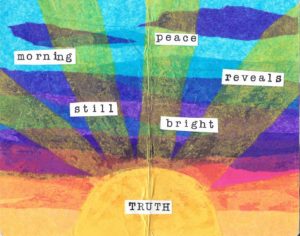
(Original mixed media collage and poem by Jennifer Alumbaugh, LMFT)
Waco has a unique opportunity to engage, as a community, in creative process exploring the intersections of heart, mind, body, and soul in the upcoming Central Texas Artist Collective (CTAC) EKPHRASIS Exhibit. The call for artists will open May 1-31st and will invite both visual artists and poets to enter to be paired with a buddy—visual artists with poets and poets with visual artists. Each duo will then have 4 months to collaborate creating a visual piece and a poem which will be displayed together in shop windows along Austin Avenue and other downtown areas opening on the 1st Friday in November 2017. The theme for each creative pair will be to explore mental health, grief and loss, and/or trauma recovery. This will be a powerful experience in the process, in the exhibit, and in the viewing. The goal is to bring many stigmatized realities to light, normalize mental health experiences, and empower one another in our coping. For complete details on how to enter EKPHRASIS Waco! please visit the CTAC information page here.
 Jennifer Alumbaugh, MS is a Licensed Marriage and Family Therapist providing clinical and professional development consultation services at Enrichment Training and Counseling Solutions. She has extensive experience working with adolescent and adult survivors of psychological and spiritual abuse, trauma (sexual violence, childhood trauma, interpersonal violence); and complex PTSD. These, along with grief and loss work are her areas of specialization. Jennifer practiced as a mental health clinician throughout Los Angeles County working with children, youth, and their families from 2007-2012. In Central Texas, Jennifer has worked as a Site Coordinator with Communities in Schools of The Heart of Texas at G.W. Carver Middle School; as an independent consultant and professional development trainer; and conference speaker. In 2016 Jennifer created an implemented a therapeutic creative writing program, Brave Young Voices, at Klaras Center for Families and at the Texas Juvenile Justice Department correctional campus at Mart, TX. She may be reached at: [email protected] or 254-405-2496.
Jennifer Alumbaugh, MS is a Licensed Marriage and Family Therapist providing clinical and professional development consultation services at Enrichment Training and Counseling Solutions. She has extensive experience working with adolescent and adult survivors of psychological and spiritual abuse, trauma (sexual violence, childhood trauma, interpersonal violence); and complex PTSD. These, along with grief and loss work are her areas of specialization. Jennifer practiced as a mental health clinician throughout Los Angeles County working with children, youth, and their families from 2007-2012. In Central Texas, Jennifer has worked as a Site Coordinator with Communities in Schools of The Heart of Texas at G.W. Carver Middle School; as an independent consultant and professional development trainer; and conference speaker. In 2016 Jennifer created an implemented a therapeutic creative writing program, Brave Young Voices, at Klaras Center for Families and at the Texas Juvenile Justice Department correctional campus at Mart, TX. She may be reached at: [email protected] or 254-405-2496.
The Act Locally Waco blog publishes posts with a connection to these Aspirations for Waco. If you are interested in writing for the Act Locally Waco Blog, please email [email protected] for more information.
By Deanna Leach, CST, LMT, LMTI
People have often asked me, “How did you know that was in my body? You went straight to it!” Well, it’s a gift and I’ve been highly trained to listen with my hands. Our bodies show us what is wrong if we will only listen. They will even lead us to emotional connections to our symptoms if we ask the right questions. A well trained alternative therapist can assist our bodies to rebalance, repair, and renew.
In my work as a CranioSacral therapist, I’ve been trained and certified by the Dr. John Upledger (D.O.) Institute to listen to what the body is showing me. I may ask questions (what we call dialoguing) to help us find the origin of the problem, what purpose the body has for holding onto it, and how we can help the body release a restriction to help it get back to homeostasis. Say for instance, you had a car accident and in the moment of the accident, you suddenly turned your head back to check on your child in the back seat as you know the impact is unavoidable. You go to the doctor because you have whiplash symptoms and they prescribe muscle relaxers. That gets you through the worst of the whiplash symptoms but something is still lingering in your neck. You seek out my assistance and we find that the fear you experienced about the safety of your child during impact is still stuck in the tissue. Often, the effect of trauma leads us to have an emotional connection to it. SomatoEmotional Release is a release of emotional energy that may be necessary to fully discharge a trauma. The car accident is a simple example, but imagine the emotions connected to a woman being raped; or a child being neglected or abused; or a soldier or police officer killing someone in the line of duty; or any number of traumas, some minor and some severe, that humans deal with in their lifetime.
In addition to CranioSacral, I use Visceral Manipulation (and Visceral Emotional therapy) to find an organ that is holding onto some emotion that is causing it to be dysfunctional (or a dysfunctional organ that is causing emotional distress). You know the term “stuffing it,” right? We literally “put things” in our bodies, particularly when we don’t want to deal with them. Dr. Barral, D.O., who developed Visceral Manipulation and other modalities, has discovered that certain organs hold particular emotions. The body’s viscera are like a complicated timepiece, each part in subtle but perpetual motion relative to the others. Problems arise when trauma or malfunction throws the system out of alignment. For instance, when my father died suddenly, I had a very supportive family who helped each other through our grief. I thought I was handling his death well. I went to a Visceral Manipulation training a few months later and, as someone worked on my spleen, I started crying. I knew immediately that the emotion was about my dad. Turns out the spleen carries profound grief. Although I felt I was doing the work of grieving, I was apparently holding the overwhelming portion of that in my spleen. With precise but subtle anatomical work, we can release these things from our bodies.
We can also work in the brain and the limbic system to help dissipate emotional responses to previous trauma. The limbic system is our emotional brain. It can react before the cognitive brain governs with reason. It is that part of our brain that controls the fight, flight, or freeze response. In a stressful situation, the brain reacts by sending nervous, chemical, and hormonal messages to the body, either instantaneously or deferred. Visceral memorization takes its course: the organs’ cells record the messages and send them back to the brain, reinforcing emotional imbalance in the brain, and setting off an emotional resonance. We can help the brain tone down an overactive response with Visceral Emotional work. Imagine how this can help someone who is suffering from post-traumatic stress disorder (PTSD); or a baby after a difficult birthing process; or an abuse survivor.
These therapies, sometimes used in conjunction with talk therapy (psychotherapy), can produce powerful results to help trauma survivors move through life in a whole new way, with better health mentally, emotionally, and physically.
Our bodies are amazing. They will carry our load if we can’t or won’t. However, at some point (we often recognize it as we age), we need to help our bodies release these restrictions before dysfunction becomes disease. If we will trust that our body can heal itself with the right therapies, we can have greater health and well-being.
A quick note on how to carefully choose your body therapist:
- Primarily, listen to your body, listen to your intuition. If a therapist doesn’t feel right, they probably aren’t right for you.
- The number of sessions should be based on simple logic and on moral agreement. You are working together and you must participate. What you do physically, nutritionally, and mentally between sessions plays a major role in treatment success. The therapist should want to refer you if you are not making some progress after 3 or 4 sessions. You should feel there is a plan. If the plan isn’t helping, try a different therapy or a different therapist.
- The therapist’s goal should be to improve the patient’s health.
- The therapist should keep their place, and not judge you or your family and friends. Avoid a therapist who makes you feel guilty or who mixes religion and therapy. Abuse does occur. Be aware of it.
- Certification and training matters. If a therapist claims to do a certain modality, ask for their training credentials. It takes more than one or two classes to become a good therapist in any modality. For the modalities I have discussed here, you can look up credentials information on IAHP.com (International Association of Healthcare Practitioners) by clicking “Find a Practitioner” and search by city or name.
Here’s to your better emotional and physical health!
 Deanna Leach, CST, LMT, LMTI, is a certified CranioSacral Therapist who continues to train extensively in alternative therapies including Visceral Manipulation, Lymph Drainage, and Manual Articular Approach. She has been licensed as a massage therapist since 1999 and has practiced CranioSacral therapy since 2001. She regularly works in intensive multi-hands CranioSacral programs around the country and with dolphins in the Bahamas. She lives with two wonderful therapy dogs, Ruby Sue and Emma, and a cat, Elle, all who she regularly serenades with original ditties.
Deanna Leach, CST, LMT, LMTI, is a certified CranioSacral Therapist who continues to train extensively in alternative therapies including Visceral Manipulation, Lymph Drainage, and Manual Articular Approach. She has been licensed as a massage therapist since 1999 and has practiced CranioSacral therapy since 2001. She regularly works in intensive multi-hands CranioSacral programs around the country and with dolphins in the Bahamas. She lives with two wonderful therapy dogs, Ruby Sue and Emma, and a cat, Elle, all who she regularly serenades with original ditties.
The Act Locally Waco blog publishes posts with a connection to these aspirations for Waco. If you are interested in writing for the Act Locally Waco Blog, please email [email protected] for more information.
By Vera Minot

(how I feel about running, most days)
When I arrived in Waco in 2013 I had no idea that my cross-country upheaval would catalyze an entire health and wellness journey for me. I began researching nutrition and preparing my meals at home, and to complement this I began working out in a gym (for a while), and I even (gasp! This part was hard) started running again. I was training for my first 5k (a big deal for me!), with bigger dreams to come, when I was hit by a car on my way home for lunch one day. As I began nursing several spinal injuries, I came to find I could no longer walk for extended periods of time without debilitating pain, let alone run. Facing potentially lifelong demobilizing injuries, I ceased my workout routines, further increasing the wellness void I had been looking to fill since arriving in Waco. I needed to find an activity that would honor my injuries, aid in my healing process, and give me the physical outlet I yearned for, I turned to that in which I had only dabbled in the past: yoga.
I started practicing yoga consistently in June of 2016, and I found that when I did my back pain decreased! Despite there being limitations to the poses (or asanas) I could perform due to my injuries, as the weeks went on I noticed I was gaining some strength in my arms, core, back, etc. Yoga seemed to be the perfect solution for what I was seeking! What I didn’t realize yet was that physical benefits are only a small part of what yoga has to offer to any one person. My journey may have begun as one of physical health, but after 7 short months I can see that while the physical benefits are many and varying, the mental health benefits greatly exceed any expectations I didn’t even know I should have.

(child’s pose, or balasana, a common resting/healing pose)
I’ve been an anxious person for as long as I can remember—I’m very self aware, so I mull over past events looking for cues for how I can better myself (“oh gosh, I didn’t ask her enough questions about herself! I need to make sure to do that more, I hope she didn’t think I was egotistical?!”), and when I’m not doing that I’m often considering the various [typically disastrous] ways a near-future event may pan out (“ok, maybe I’ll invite her for a hang out next week and I’ll make sure to ask her what she likes to cook and focus on her, but what if she thinks I’m prying? Maybe a hangout next week is too soon?”). Long story short, living in the present hasn’t always been easy for me, and unfortunately anxiety resides and thrives when I focus on the past and the future. This is where yoga comes in.
Since beginning my practice, not only have the frequency and intensity of my anxious moments decreased drastically (I realize anxiety manifests differently for everyone and as such it’s very much an umbrella term), but I’ve noticed more specific benefits to my mental health as well. Naturally, there’s the obvious increase in endorphins that happens with any exercise. There’s also the incredible sense of pride and accomplishment I feel when I make progress with an asana I wasn’t able to perform before. Perhaps most importantly though, I have increased concentration and focusing abilities (especially when it comes to doing tasks I didn’t really want to do, like vacuuming my house and going to work 🙂 ), I find that I am able to stop, breathe, think, and then act as opposed to charging forward with my conditioned, emotional reactions, and best of all my tolerance for stress and stressful situations has increased significantly!
A personal example of these benefits presented itself recently when I had to have some tough conversations with a good friend of mine. Our friendship had gone awry, and as you can imagine the conversations that can ensue around a situation like this tend to be very emotionally charged. Both of us were upset, and in that moment I would rather have been anywhere other than on her couch, talking about whether this friendship was worth continuing. In the past I probably would have written an impassioned letter, detailing every wrong, every hurt, regardless of its necessity, and then run away so I wouldn’t have to see the fallout. Present “me” was able to sit through the “awkward” silences in the conversation that night, stay true to my needs and boundaries, and respect my friend despite the incendiary nature of some of the accusations being hurled my way. We weren’t able to resolve our issues, but I was able to move forward with a sense of calm acceptance I know would have been foreign to me even 2 years ago. I credit yoga 100% for arming me with the skills to handle that situation.
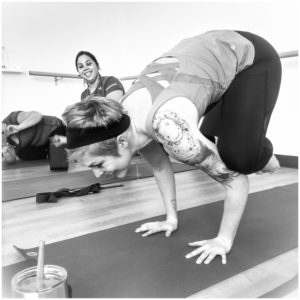
(this is me doing Bakasana, or Crow’s Pose, one of the first times I was able to successfully do it! Still working on the form of course)
The benefits to my mental health since beginning my consistent practice have been so great that naturally I began to wonder why. I’m by no means a voice of authority on the scientific relationship between yoga and mental health, but here’s what I’ve found—it all seems to come down to the same couple things. BKS Iyengar, the esteemed founder of Iyengar Yoga, said “Penetration of our mind is our goal, but in the beginning to set things in motion, there is no substitute for sweat.” What we practice physiologically develops new habits and reconditions old ones that affect us mentally. When we breathe through a difficult pose, breathing deeper into the muscle or joint that’s struggling, we learn how to endure a stressful situation. When we focus on keeping our inhales and exhales even and slow to regulate our heartbeat, this keeps us in the present moment (being in the present moment is also called mindfulness)—this in turn quiets our mind, which is key in increasing concentration and focus. Mindfulness is grounding, and neurologically this helps train the brain to stay in executive thinking mode (this is where the stop, breathe, think, then act happens) as opposed to the more primal fight/flight/freeze mode. When we are practicing our balance, we are attuning to our body, making the tiny adjustments necessary to stay in a pose. Learning to attune to my body has helped me recognize the physiological precursors to stress and anxiety so that I can deal with them with a calm mind and heart as opposed to letting them overtake me.

(Kim and her daughter in the studio foyer, photo credit Sarah Hill Photography)
There are some yogis and yoginis out there who learn these lessons on their own, in their home practice. I, however, benefit greatly from a teacher’s guidance, so I’m so grateful that Yoga8 exists here in Waco. I’ve experienced all the studios in town, but when it comes down to it the feeling of love and acceptance for who I am and where I am in my journey that I feel at Yoga8 is unparalleled elsewhere, in my opinion. Kim, the owner of the studio, has a beautiful spirit as well as an incredible knowledge of the human body and its capabilities, and all of the other RYT-200 certified teachers at the studio truly take to heart Kim’s mission when she opened Yoga8 two years ago. Their mission is to improve as many lives as possible.
My short time with Yoga 8 has truly revitalized me. My time spent in their myriad classes, from the restorative Healing classes to their sweatier Kick-UR-Asana classes (and any of the classes in between) has taught me how to attune to/regulate my body and be mindful whether my toes are on the mat or not. The lessons I’ve learned and will continue to learn as I progress in my yoga journey have dramatically increased my mental health, and as such improved my life. To Kim, I can say: mission accomplished.
 Vera Minot is a reluctant adult from Arizona trying to navigate life in Waco and in this world. She finds joy in cooking, gardening, her cats, social justice, creative endeavors, books, and of course yoga.
Vera Minot is a reluctant adult from Arizona trying to navigate life in Waco and in this world. She finds joy in cooking, gardening, her cats, social justice, creative endeavors, books, and of course yoga.
By Jamie Graham
Twenty-two years ago, I found myself lying on a massage table with fine thin needles being inserted into various parts of my body. The problem that had brought me to this unusual position was a monthly fluctuation in moods called Premenstrual Syndrome, accompanied by severe debilitating cramps. During my monthly cycle, I would swing between tears and irritability. Acupuncture had been recommended to me by a friend whose sister was attending the Academy of Oriental Medicine at Austin (AOMA). My friend assured me her sister, or one of her fellow interns in the student clinic at AOMA, would be able to help both with the pain and the moods.
 Being in such misery, I was willing to try anything. During my treatment, which included two interns and an instructor asking questions, taking my pulse and looking at my tongue, I mentioned I often had a feeling of something being stuck in my throat that wouldn’t go down when I swallowed. A look of understanding passed between the two interns and one of them explained this was something Chinese medicine called Plum Pi Qi and it clearly was indicated in my diagnosis of Liver Qi stagnation. After the needles were removed, they also gave me an herbal formula and recommended I return for future treatments.
Being in such misery, I was willing to try anything. During my treatment, which included two interns and an instructor asking questions, taking my pulse and looking at my tongue, I mentioned I often had a feeling of something being stuck in my throat that wouldn’t go down when I swallowed. A look of understanding passed between the two interns and one of them explained this was something Chinese medicine called Plum Pi Qi and it clearly was indicated in my diagnosis of Liver Qi stagnation. After the needles were removed, they also gave me an herbal formula and recommended I return for future treatments.
I was amazed at the results. I felt calmer, more centered and as a bonus, during the next monthly cycle, my cramps were much reduced. I was hooked.
Six years later, I was the intern seeing clients in the student clinic at AOMA. Many of those clients had mental health issues, ranging from depression, anxiety, grief, anger, PTSD and many others.
At AOMA, we learned emotional issues were related to stagnation of an energy called Qi (pronounced chee). Each emotion was also related to a specific organ system. Grief was related to lungs, anger and depression to liver, fear to kidneys, worry to spleen, overjoy (mania) to heart. By releasing this stagnation with the acupuncture needles and rebalancing the specific organ system, these mental health issues could eventually be resolved.
After graduation, I began to research how acupuncture helps resolve these issues. Western medicine had begun doing research studies on acupuncture. While many of these focused on pain, several of them also focused on mental health issues. There are many theories as to why acupuncture helps pain and other issues such as depression, anxiety and PTSD, one of the things we do know is acupuncture affects brain chemistry. It causes the body to release endorphins, serotonin, and enkephalins and other brain chemicals that help our body with pain, emotions and our immune system. It also increases receptor sites for these chemicals to attach to within the body.
One of the most interesting continuing education classes I have taken was working with veterans suffering from PTSD through an organization called Vet TRIIP (Veterans Team Recovery Integrative Immersion Process). This organization uses a multi-disciplinary approach to working with veteran PTSD. They incorporate tai chi or qigong, acupuncture, massage therapy, chiropractic, talk therapy and other modalities to help the veterans in their recovery.
The first veteran I treated was one who was, “wound very tight.” He had chronic pain in his lower back and neck. Using just a few acupuncture needles and sitting with him quietly, I watch as the tension left his body. After the needles were removed, he stood up, and a smile came across his face as he realized his pain had eased. “I feel so relaxed,” he said, “and the pain is much less.”
Another veteran I worked with was also a survivor of sexual assault. She was having severe anxiety and insomnia. She also had chronic pain. She, too, was very tense—emotionally and physically. During the treatment, she was actually able to fall asleep, and afterwards told me she felt calmer, like she could finally take a deep breath.
Of course, veterans with PTSD aren’t the only ones to benefit from acupuncture’s effects on mental health issues.
Another training I took is called NADA (National Acupuncture Detoxification Association). This simple 5 needle acupuncture, done entirely in the outer ear, has been used to help people wean off drugs, alcohol and tobacco. One of its main effects is to help reduce stress and anxiety. It was used by acupuncturists to help first responders and victims deal with stress after 9/11, Hurricane Katrina and many other disasters. It’s also used by Acupuncturists Without Borders when they respond to disaster sites around the world.
I use NADA quite often in conjunction with body acupuncture for my clients experiencing stress, depression or anxiety. One of the main points in this treatment is Shen Men, which translates as Spirit Gate. Quite often, if someone is in a stressful situation, I will add a very tiny (.06 mm) needle on a piece of tape to Shen Men, to help them deal with stress after they leave the clinic.
During my 16 years of treating clients with acupuncture, I’m still amazed when someone sits up from the treatment table with a relaxed smile on their face as they tell me how calm and energized they feel. And often, that’s just a side benefit from other issues we’ve been addressing. It’s one of the reasons I love my work.
 Jamie Graham is the owner of Healing Touch Acupuncture and is a licensed acupuncturist practicing in Waco. She has a Master of Science in Oriental Medicine from the Academy of Oriental Medicine at Austin. She and her husband, Bob, will be celebrating 43 years of marriage in March. She has one daughter and one grandson who are the joy of her life. She is owned by a Russian blue cat named Walter and a very spoiled shih tzu named Brandi. When she’s not using needles as an acupuncturist, she uses different kinds of needles in her textile art, quilting, knitting and embroidery work.
Jamie Graham is the owner of Healing Touch Acupuncture and is a licensed acupuncturist practicing in Waco. She has a Master of Science in Oriental Medicine from the Academy of Oriental Medicine at Austin. She and her husband, Bob, will be celebrating 43 years of marriage in March. She has one daughter and one grandson who are the joy of her life. She is owned by a Russian blue cat named Walter and a very spoiled shih tzu named Brandi. When she’s not using needles as an acupuncturist, she uses different kinds of needles in her textile art, quilting, knitting and embroidery work.
You may contact Jamie at Healing Touch Acupuncture: 254-759-8050 | [email protected] | www.healingtouchacupuncture.com | www.Facebook.com/HealingTouchAcupuncture
The Act Locally Waco blog publishes posts with a connection to these aspirations for Waco. If you are interested in writing for the Act Locally Waco Blog, please email [email protected] for more information.
By Salley Schmid
Stress management is a topic that can go in many different directions. All very useful and important directions in which to explore stress management. In today’s Act Locally Waco Mental Health blog, I am going to turn your attention to stress management during the holidays with regard to relationships and traditions.
There are some easier to implement stress management tips around these topics and there are some not so easy to implement, but powerfully transformative stress management tips. Here are a few of hopefully easier to implement ideas:
- Live / spend / gift within your means shame free
- Say no to make room for yes:
- pick fewer traditions, events, and travel scenarios
- Delegate or purchase pre-prepared when you can (not everything has to be homemade, give yourself a break)
- Decide as a family what are the few most important traditions and values to express during the holidays and endeavor to meet those and if nothing else gets done it’s ok
- Recruit help with anything you can – even if you need to pay for some of the help – everyone needs to earn a living and your mental, emotional health is important enough to invest in, hence paying for the help to be less burdened.
AAANNND for some that may be hard in the short run, but stress relieving and energy saving in the long run: Practice healthy boundaries in relationships. For example, when giving gifts that are within your financial means remember:
- your gifts do not define you
- others’ responses to your gifts do not define you
- your values and alignment with your values is what defines you – your heart’s intention.
Letting go of feeling responsible for how others feel and think is an act of setting a healthy boundary. The mindset of the above 3 points helps you do this letting go in order to live that healthy boundary.
Anticipation of the perfect holiday experience is a bit of a set up. That’s a tall order to fill. It is basically putting the holiday on a very high pedestal and it is a long fall from that pedestal. One detail is off and the whole experience seems tainted. Letting go of these high expectations and the anticipation of the perfect experience, makes room for flexibility, mistakes, forgiveness, and adaptability. It paves the way for resilience and peace.
Discuss what roles people can play in the holiday experience – give people jobs. Most individuals want to feel like they are making a meaningful contribution, not solely a recipient of your service. Having a role or job equals feeling useful and meaningful, not having a role or job equals feeling like a burden and useless. Invite everyone to feel useful and meaningful this holiday season.
If you have new family members – such as by marriage, invite the new members to share a tradition of their own with your family, get the details so that you can accommodate. With a heart of gratitude, give up something of your own if necessary to make room for the new.
Be flexible. As families grow dynamics of all sorts change. Maybe a different calendar date needs to be set aside for a holiday to get everyone together. The togetherness is what is important, not the number on a calendar.
Set boundaries in advance with behaviors or scenarios that have led to resentment or difficulty in the past. For example, if you have a family member who typically gets hammered at the holidays and ends up creating a difficult scenario, in advance, invite that person to come sober and stay sober so that you can connect with that person rather than connecting with alcohol. Invite them to refrain from coming if they don’t want to remain sober. Let them know if they come and end up intoxicated, you will call for a ride for them and assist them in getting home without driving.
Another example is with pets. If your holiday guests have in the past been known to bring their pets without getting permission or even knowing that they are unwelcome, in advance, set the boundary with them. Ask them to make alternative arrangements for the pets, to bring crates, or stay at a pet friendly hotel . . . and express your gratitude for their presence without the pets.
Boundaries are not easy to set. When setting them, others will not always receive them well, might accuse you of being mean or selfish, and might get mad at you. All of these responses are possible but not an indicator that you are in the wrong. It is not your job to ensure everyone is pleased with your every move. That is an impossible feat. In the long run, setting healthy boundaries reduces stress, even if it might take a bit of time to get there. However, it is less stressful than year after year dreading and then resentfully enduring the intolerable.
I wish you peace and joy this holiday season, hold on to what matters, relationships and love, not things, not food, not perfection. Embrace life and family in all of its glorious messiness. Hope for the best, but don’t expect it. Rather, let the days unfold without trying to overly orchestrate each moment and experience. Organically occurring memories will be the most meaningful. Orchestrated moments tend to carry the memory of the stress they caused trying to orchestrate them. Let peace and joy be the theme.
 Salley Schmid’s counseling practice specializes in helping people transition to a place of strength after experiencing any form of interpersonal trauma or pain, dissatisfaction in relationships, the loss of a sense of self. I work with individuals, families and parents from a family systems perspective. I have extensive experience working with individuals who have experienced psychological or emotional or sexual abuse or any interpersonal trauma, traumatic grief, divorce, blended family work, parenting challenges and attachment difficulties. Salley Schmid, LMFT can be contacted at Enrichment Counseling at: 254-235-3500 or [email protected].
Salley Schmid’s counseling practice specializes in helping people transition to a place of strength after experiencing any form of interpersonal trauma or pain, dissatisfaction in relationships, the loss of a sense of self. I work with individuals, families and parents from a family systems perspective. I have extensive experience working with individuals who have experienced psychological or emotional or sexual abuse or any interpersonal trauma, traumatic grief, divorce, blended family work, parenting challenges and attachment difficulties. Salley Schmid, LMFT can be contacted at Enrichment Counseling at: 254-235-3500 or [email protected].
By Jennifer Alumbaugh
I have a confession: I’m not entirely certain that the pursuit of happiness is a necessarily useful or wholly possible endeavor.
Now, before you grab your pitchforks or rotten tomatoes, stay with me a while inside this idea. I’m a much bigger fan of the pursuit of joy. You might think I’m just arguing semantics. And you may hold to that thought by the time you reach the end of this blog. But I propose that the difference is significant and goes much deeper than mere language.
Clarification: I’m not entirely certain that happiness—pure, unadulterated, levity—is attainable for everyone.
Yes. That’s better. A more true representation of my thesis.
Caveat: I am someone who has lived with chronic grief her whole life, a pervasive soul sorrow that has cast a shadow over so many moments. My exploration is absolutely colored by this experience. I also write as someone who has carried an immense amount of shame and guilt around my difficulty with experiencing happiness. I realize that there may be some readers who have difficulty grasping this notion and for that, I am sincerely grateful.
It’s important for us to take a look at some of the mechanics that go into how people feel the emotions they encounter. Personality types and nervous system settings influence the ways in which we experience the world. Some people self-identify—through a process of self-discovery—as Empaths or Highly Sensitive individuals. This is a personality type, a biological setting, people are either prone to or not. These individuals have emotional feeling receptors which operate at a much broader frequency than others of us. They can attune to what others are feeling, experiencing the feeling with another vividly and in real time. A person’s capacity for compassion also influences happiness. Identity and lived-experiences are significant contributors or detractors of happiness—if one moves about the world with little conflict regarding their personhood, this is a kind of privilege that contributes to increased levels of happiness while those for whom safety, rights, and access to life’s necessities and bounty are limited often exhibit difficulties with sustaining happiness. Certainly our location—geographically and socially—influences our ability to experience happiness as do our experiences in the world from freedoms, to traumas, to exposure to violence, to attachments, to opportunities, to privileges.
The teachings tell us that we could be happy if we just choose to be. Choice. Such a tricky word. There is a great deal about our identities and our experiences that we have no agency over to accept or decline or even change. Some of us have more wiggle room than others in changing certain aspects of our circumstances—but even those with the most resources are limited, fundamentally, in what aspects of self and life they can alter. And while all of us have some choices, we don’t all have the same choices or the same access to changing our circumstances.
As a white woman I can choose to engage—or not—with news and social justice issues around race; my Black kindred do not have this choice. They cannot decide to not be Black one day because it would be easier. As an ally, I choose to remain engaged, aware, connected, and present with feeling the viscera of race trauma in the US today. I don’t know it first hand, but empathically I remain open to the grief, sorrow, horror, outrage, and despair experienced by my friends of color.
I acknowledge that it is a choice I make to keep my self, my heart, my soul open to the effects of being aware of social (in)justices occurring in my community, my country, and globally. I realize that this choice puts me at risk for experiencing reduced instances of happiness. I could tune out. There is indeed a certain bliss that accompanies ignorance. For me, that path is not an option because it is out of line with my authentic being and becoming.
But here is the thing, in the very midst of grief, of sorrow, of pain, I continue to experience life-giving joys. While happiness is a fleeting moment, dependent up on circumstances—a job promotion, a favorite flavor of ice cream, a silly joke, reciprocated affection of a beloved—joy abides, even inside the darkest night.
Joy is a kindred of contentment, of feeling fulfilled, of deep gratitude. Joy can be dancing delight. Joy can be great belly laughter. Joy is awe-struck wonder. Joy is a heart full and over-flowing. Joy is doing what we love—a resounding satisfaction. Joy can show up in our tear-stained storms radiating rainbows.
My intention with this post is not some doomsday moratorium on happiness. My hope is that maybe we open the circle a little wider and before reposting that next “you could be happy if you really wanted to” meme, you pause a moment. Consider those in your community who are beared down in grief. Those who have survived unspeakable losses. Those who navigate the challenges of mental or medical health issues. Consider our kin in war zones and those surviving hunger and home and financial insecurities daily. Hold for a moment those who move about the world inside identities that are bullied, threatened, mocked, and misunderstood. Make some room for their difficulties with happiness and allow for the possibility of joy. Happiness is so much more luck than choice; joy is a practice.
Wherever you may be in this moment, whatever burdens you bear, whatever lightness you relish, may an extraordinary joy show up for you today, and linger a while in your heart.
 Jennifer Alumbaugh, MS is a Licensed Marriage and Family Therapist providing clinical and professional development consultation services at Enrichment Training and Counseling Solutions. She has extensive experience working with adolescent and adult survivors of psychological and spiritual abuse, trauma (sexual violence, childhood trauma, interpersonal violence); and complex PTSD. These, along with grief and loss work are her areas of specialization. Jennifer practiced as a mental health clinician throughout Los Angeles County working with children, youth, and their families from 2007-2012. In Central Texas, Jennifer has worked as a Site Coordinator with Communities in Schools of The Heart of Texas at G.W. Carver Middle School; as an independent consultant and professional development trainer; and conference speaker. In 2016 Jennifer created an implemented a therapeutic creative writing program, Brave Young Voices, at Klaras Center for Families and at the Texas Juvenile Justice Department correctional campus at Mart, TX. She may be reached at: [email protected] or 254-405-2496.
Jennifer Alumbaugh, MS is a Licensed Marriage and Family Therapist providing clinical and professional development consultation services at Enrichment Training and Counseling Solutions. She has extensive experience working with adolescent and adult survivors of psychological and spiritual abuse, trauma (sexual violence, childhood trauma, interpersonal violence); and complex PTSD. These, along with grief and loss work are her areas of specialization. Jennifer practiced as a mental health clinician throughout Los Angeles County working with children, youth, and their families from 2007-2012. In Central Texas, Jennifer has worked as a Site Coordinator with Communities in Schools of The Heart of Texas at G.W. Carver Middle School; as an independent consultant and professional development trainer; and conference speaker. In 2016 Jennifer created an implemented a therapeutic creative writing program, Brave Young Voices, at Klaras Center for Families and at the Texas Juvenile Justice Department correctional campus at Mart, TX. She may be reached at: [email protected] or 254-405-2496.
The Act Locally Waco blog publishes posts with a connection to these Aspirations for Waco. If you are interested in writing for the Act Locally Waco Blog, please email [email protected] for more information.
By Cynthia Cunningham
My daughter has bipolar disorder. There! I said it. Ten years ago I said aloud those scary words that send many of my family and friends into hiding. But why? This diagnosis just means that her brain has some problems maintaining her moods, activity levels and often just completing daily tasks. That doesn’t sound like something to be afraid of, does it?
But yet, our society is afraid! We’ve been taught for centuries that mental illness is a bad thing to be fearful of. Look at any social media and you will see memes using mental illness as a joke. And today, you can hardly go a day without hearing the words that apply to mental health issues. “He is acting so schizo!” “This weather is crazy!”
Somehow we forgot to use the correct language. And by using words that are associated with mental health conditions, without even realizing it, we have once again stigmatized mental illness. By keeping the stigma alive against mental illness, we shame those who are living with this condition. Isn’t that the bullying that we have been teaching our children not to do to others? Not sure this is offensive? Test yourself: replace any of the words used for mental health with the word “Cancer”. Is it still funny?
Did you know that 1 in 4 people live with a mental health condition? If these numbers don’t catch your attention, try these:
- There are an estimated 80,022,714* people living in the U.S. with a mental health condition.
- There are an estimated 6,923,821* people living in Texas with a mental health condition.
- There are an estimated 65,802* people living in Waco with a mental health condition.
That’s a lot of people that we are offending with our words! And those words cause people to want to hide away and not seek help. Instead they try to handle these illnesses themselves, or chose not to acknowledge that there is even anything wrong. Some are so overcome with the pain of dealing with the mental illness that they chose to end the pain. And we can stop this! We MUST stop this!
So how can we fix it? We need to start the conversations that let people know that it is ok to talk about mental illness. Luckily, there is just such an initiative that was launched in Texas! The Meadows Mental Health Policy Institute launched OkayToSay.org this year. This initiative increases awareness that most mental health conditions are treatable. It gives hope to those affected by these conditions.
Since this is a Texas-based initiative, any and all Texans can contribute. You can join those who have already posted, like President George W. Bush, Emmitt Smith, and Mark Cuban. This website shows you a few different ways to “make it okay to say.” You can share your own personal story, add your name to the support wall, you can post a video telling others how it is ok to talk about mental illness. You can even select to share messages on your social media and invite others to share their voices.
The real importance of this initiative is to get the conversations going about how important it is to talk about mental health conditions. Right now there is a nationwide shortage of psychiatrists. Often when someone decides to seek help they face a long waiting period just for the initial visit. And that is if they have insurance. Those without insurance coverage must rely on other local programs, which are also quite busy. By having conversations, we can start raising awareness and addressing issues with our political representatives to get more focus on services and programs that are really needed to address these health issues.
I am a living example of how talking about mental illness makes a difference. I spoke up for my daughter, got her the medical help she needed and got education for our whole family so we could learn how to help her live a life of recovery with her mental health condition. Today she is my pride and joy. She is happily married and works as a Certified Peer Support Specialist for NAMI Waco. Her job, along with our other 11 peers, is part of our free Peer Support program for people who have a mental health diagnosis and seek to improve their health.
I was once asked why I talked so openly about my daughter’s illness. My reply was “No one ever told me not to talk about it and I realized that the more I talked the more I learned and could help her and others.” As a result, I learned about NAMI.org. A grassroots organization that’s purpose is to educate, support and advocate for those whose lives have been affected by a mental health condition. This was just what my family needed! And I found it by speaking out! I am pleased to say today I work for the local affiliate, NAMI Waco, doing a job that I love. I am one person, but I can make a difference! I am doing my part to help others through this difficult journey. And I hope others will join me!
It is really simple to do! This work was started earlier this year in Waco by a mental health committee of Prosper Waco and we want to make it spread. It is quite simple to use. Just go to OkayToSay.org, search “in your area” and click on “share your story”. Let’s all make it OkayToSay!!!!
 Cynthia Cunningham, a Wacoan since age 2, is the Executive Director for NAMI Waco. She lives with her husband of 28 years, Bobby, and two spoiled dogs and one royal cat! Her passion is educating others about mental health. She can be contacted at: www.NAMIWaco.com
Cynthia Cunningham, a Wacoan since age 2, is the Executive Director for NAMI Waco. She lives with her husband of 28 years, Bobby, and two spoiled dogs and one royal cat! Her passion is educating others about mental health. She can be contacted at: www.NAMIWaco.com
The Act Locally Waco blog publishes posts with a connection to these aspirations for Waco. If you are interested in writing for the Act Locally Waco Blog, please email [email protected] for more information.
*using data from the projected 2015 census
by Jennifer Alumbaugh, LMFT
I’ve had the honor of reading an advance copy of Healing from Hidden Abuse by Shannon Thomas, LCSW in exchange for my feedback and honest review. Even before this book came out, I have been impressed with the integrity of Thomas’ reflections on psychological, emotional, and spiritual abuse from both the theological and the psychological standpoint. As a Licensed Marriage and Family Therapist with a degree in Theology and a personal history in a number of church communities, it is not often I encounter material that resonates with such unapologetic and unfaltering truth. Thomas’ Healing from Hidden Abuse is one such book.
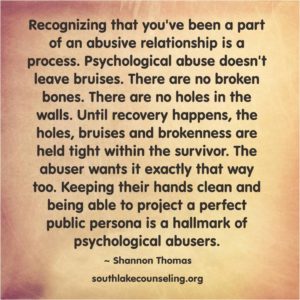 Healing from Hidden Abuse is organized into several parts: introduction with background on the 2016 research project, “Examining Patterns of Psychological Abuse;” moving into the Basics of Psychological Abuse—a kind of 101 primer for anyone previously unfamiliar; the Six Stages of Recovery: Despair, Education, Awakening, Boundaries, Restoration, Maintenance; an address to family and friends of survivors; a resource section including a bibliography; and a collection of personal reflection and journal prompts to move the reader through their own process or to facilitate group process.
Healing from Hidden Abuse is organized into several parts: introduction with background on the 2016 research project, “Examining Patterns of Psychological Abuse;” moving into the Basics of Psychological Abuse—a kind of 101 primer for anyone previously unfamiliar; the Six Stages of Recovery: Despair, Education, Awakening, Boundaries, Restoration, Maintenance; an address to family and friends of survivors; a resource section including a bibliography; and a collection of personal reflection and journal prompts to move the reader through their own process or to facilitate group process.
In both my personal healing process and my professional clinical work with clients, when I consider materials to use or recommend, I look for several things:
Does the material have substance? I tend to shy away from materials that are too geared toward the beginner in self-awareness. I want something that is accessible to both the novice and the seasoned professional. I look for content that will inform, challenge, and inspire me.
Is the information clinically sound? Is there research and data that backs up the claims the author is making? Does the author have personal and/or professional experience in the field? —I want to be able to trust the author. I also evaluate whether or not the content holds water when I consider my own research, education, training, and clinical experience.
Is it clinically substantial while at the same time accessible to laypeople who are not mental health professionals and who may not be as familiar with the language of the profession? I want to use material that can connect with people who are engaging from a variety of professions, education levels, and experiences.
Is the language inclusive and intersectional? Is there an over-all cultural competence across a variety of identities? Especially in this time, I keep a look out for material that is gender and identity inclusive and retains minimal to no assumptions about identity and relationships.
Is there any bias in the content—skewed toward one experience over another—rather than encompassing the broad range of possible experiences?
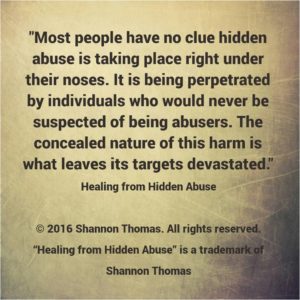 I’m pleased to report that Thomas’ work meets or exceeds my criteria, for the most part. While there is attention to dispelling the myths about abusers being only certain genders, there is a use of binary gender terms.
I’m pleased to report that Thomas’ work meets or exceeds my criteria, for the most part. While there is attention to dispelling the myths about abusers being only certain genders, there is a use of binary gender terms.
This book is deeply relevant and meaningful to anyone who has survived psychological and spiritual abuse from parents, pastors, partners, co-workers, friends, and others in their community. Beyond my resounding recommendation of this book to anyone who has or is surviving “Hidden Abuse,” I recommend it to anyone who loves, supports, is friends with a survivor. The education and insight available in this book is valuable to anyone striving to cultivate healthy, authentic, and loving relationships free from toxic dynamics.
In addition to being a mental health professional who supports others in their healing and recovery process, I have personally experienced psychological and spiritual abuse and continue to do the work of maintaining my recovery. It is these experiences especially which have motivated and inspired me to enrich my education and training in this specific area in order to be able to serve clients in need of this particular healing work. I center my own work as well as the process through which I guide my clients, in love and truth. What comes under attack with psychological and spiritual abuse is the truth, and learning to trust one’s self, one’s own intuition, and even one’s own spiritual experience is a core component in the healing process. Many survivors of psychological abuse have had the profoundly invalidating experience of not being believed when they reach out to others for help. If you receive nothing else from this blog post, I hope it is this truth:
I believe you. You matter. Your experiences, your pain, your grief, is real. There is a way out of despair. You don’t have to suffer alone or in silence. You are worthy of Love. You deserve to live a thriving life, as your whole and authentic self.
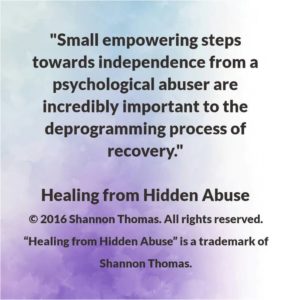 I will be using this text in my practice with clients individually, as a group facilitator, and as a professional development consultant providing trainings to various community agencies—police departments, domestic violence programs and shelters, and other mental and social service organizations. If you have had or think you may have had an experience with psychological or spiritual abuse and would like some support in sorting through the recovery process, or if you are connected to an agency interested in a professional development training on psychological abuse, please contact me through the Enrichment Contact Us page.
I will be using this text in my practice with clients individually, as a group facilitator, and as a professional development consultant providing trainings to various community agencies—police departments, domestic violence programs and shelters, and other mental and social service organizations. If you have had or think you may have had an experience with psychological or spiritual abuse and would like some support in sorting through the recovery process, or if you are connected to an agency interested in a professional development training on psychological abuse, please contact me through the Enrichment Contact Us page.
 Jennifer Alumbaugh, MS is a Licensed Marriage and Family Therapist providing clinical and professional development consultation services at Enrichment Training and Counseling Solutions. She has extensive experience working with adolescent and adult survivors of psychological and spiritual abuse, trauma (sexual violence, childhood trauma, interpersonal violence); and complex PTSD. These, along with grief and loss work are her areas of specialization. Jennifer practiced as a mental health clinician throughout Los Angeles County working with children, youth, and their families from 2007-2012. In Central Texas, Jennifer has worked as a Site Coordinator with Communities in Schools of The Heart of Texas at G.W. Carver Middle School; as an independent consultant and professional development trainer; and conference speaker. In 2016 Jennifer created an implemented a therapeutic creative writing program, Brave Young Voices, at Klaras Center for Families and at the Texas Juvenile Justice Department correctional campus at Mart, TX. She may be reached at: [email protected] or 254-405-2496.
Jennifer Alumbaugh, MS is a Licensed Marriage and Family Therapist providing clinical and professional development consultation services at Enrichment Training and Counseling Solutions. She has extensive experience working with adolescent and adult survivors of psychological and spiritual abuse, trauma (sexual violence, childhood trauma, interpersonal violence); and complex PTSD. These, along with grief and loss work are her areas of specialization. Jennifer practiced as a mental health clinician throughout Los Angeles County working with children, youth, and their families from 2007-2012. In Central Texas, Jennifer has worked as a Site Coordinator with Communities in Schools of The Heart of Texas at G.W. Carver Middle School; as an independent consultant and professional development trainer; and conference speaker. In 2016 Jennifer created an implemented a therapeutic creative writing program, Brave Young Voices, at Klaras Center for Families and at the Texas Juvenile Justice Department correctional campus at Mart, TX. She may be reached at: [email protected] or 254-405-2496.
The Act Locally Waco blog publishes posts with a connection to these Aspirations for Waco. If you are interested in writing for the Act Locally Waco Blog, please email [email protected] for more information.
